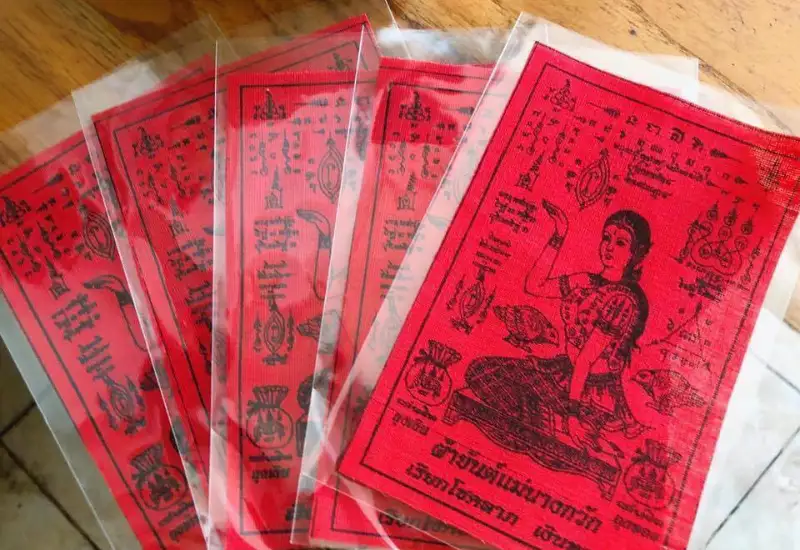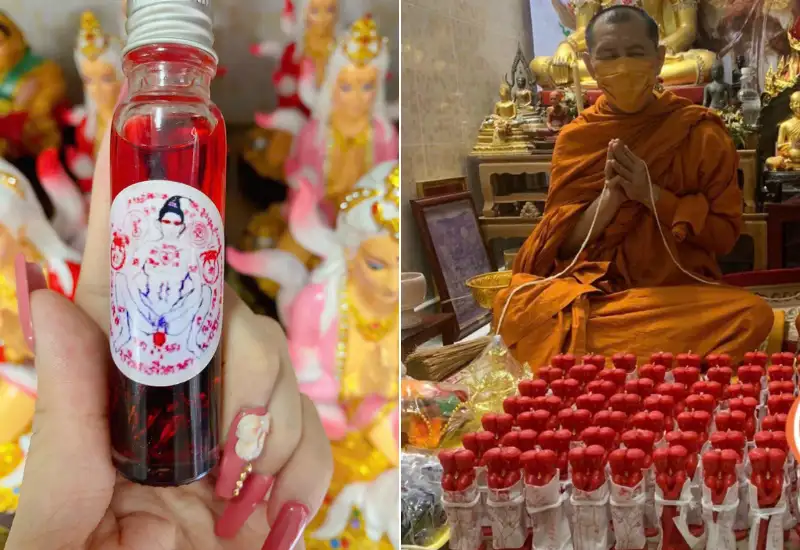Thai love charms are an integral part of Thailand’s spiritual culture, shrouded in mysterious tales and captivating allure. Believed to attract love and make the wearer irresistible, these charms hold a unique place in Thai tradition. This article explores Thai love charms, their types, effects, and important precautions to consider.
What are Thai love charms?

Types of Thai love charms
Love charms vary based on purpose and method. Common types include:
- Traditional love charms: Crafted using personal items like hair or nails, these highly personalized charms require meticulous rituals.
- High-level love charms: Performed by experienced shamans, these complex rituals incorporate advanced spiritual elements for greater potency.
- Modern love charms: Made from accessible, affordable materials, these are sold at feng shui shops or online and are easier to use at home.
The strange allure of Thai love charms
Thai love charms hold a unique appeal for those seeking romance. Devotees believe they can win the heart of their beloved, strengthen existing relationships, resolve misunderstandings, and foster deeper connections.
Do Thai love Charms really work?
Many swear by the power of Thai love charms, while others remain skeptical. Believers claim that proper rituals yield desired romantic outcomes. However, skeptics argue that the charms’ effectiveness may stem from psychological factors: belief in the charm boosts confidence, naturally improving relationship prospects.
Potential risks of love charms
While love charms may deliver results, they can also lead to unforeseen consequences. Overuse may cause emotional distress when users realize the love they’ve gained is artificial, leading to feelings of emptiness or relationship issues. Improper rituals could also trigger negative outcomes, such as relationship breakdowns or spiritual side effects.
Precautions when using Thai love charms
If you choose to use a love charm, keep these points in mind:
- Choose reputable practitioners: Ensure rituals are performed by trusted, experienced shamans to achieve desired results.
- Avoid abuse: Love charms should not manipulate others’ emotions. Forcing love can lead to serious consequences, like loss of trust or genuine affection.
- Respect beliefs: As part of Thai spiritual culture, love charms should be approached with understanding and not misused for selfish purposes.
Signs of being affected by a love charm
Those under a love charm’s influence may experience intense, uncontrollable feelings for someone, often feeling obsessed or unnaturally fixated. They might also act irrationally, going to extreme lengths to maintain the relationship.
Taboos when using love charms
To avoid adverse effects, adhere to these taboos:
- Don’t Force Emotions: Love charms should not coerce others. Genuine relationships rely on mutual consent and respect.
- Avoid Unstable Emotions: Performing rituals while angry, jealous, or upset can amplify negative energies, leading to undesirable outcomes.
- Don’t Overuse: Relationships should be built on mutual understanding and authentic emotions, not external forces.
Beware of love charm scams on social media
Recently, scammers have exploited people’s trust, particularly in romantic matters, by selling fake “love charms” on social media. These products, often homemade with colored powders or fragrances, are falsely advertised as solutions for relationship issues, such as reuniting with an ex or improving marriages.
According to police in Kim Bảng, Hà Nam, a group of 19–20-year-olds without stable jobs produced these items, packaging them in small glass jars or as powders and marketing them as “love charms.” Priced between 250,000 and 500,000 VND, they were promoted with promises of love, luck, and wealth.
Scammers used Facebook pages like “Vũ Hoàng Thiên – Thai Spirituality” and “Nguyễn Phong – Thai Spirituality” to advertise, posting fake customer testimonials created by their own accounts to build trust.

Beware of other scams
Beyond fake love charms, scammers employ tactics like online sales fraud or luring people into high-commission schemes. For instance, in Đức Cơ, Gia Lai, a victim lost over 1.9 billion VND in an online sales scam promising high returns.
Common scam tactics:
- Impersonating Authority Figures: Scammers pose as police, teachers, or respected individuals to gain trust and extract personal information or money.
- High-Profit Online Sales: Victims are asked to place orders with promises of refunds plus commissions. Initial small payments build trust, followed by demands for larger sums.
- Impersonating Officials: Exploiting unfamiliarity with apps like VNeID, scammers pose as school treasurers or police, tricking people into installing fake apps to access bank accounts and steal funds.
How to protect yourself from scams
The Cybersecurity Department (Ministry of Information and Communications) advises against believing superstitious social media ads. When engaging in online transactions, exercise caution and choose reputable sources. Verify identities and information before any transaction.
If you suspect fraud, report it to the police immediately. Follow these tips:
- Never share personal information.
- Verify identities through official channels.
- Be cautious with online transactions, especially those requiring upfront payments or app installations from unknown sources.
- Contact authorities promptly if you suspect a scam.
Thai love charms remain a controversial and enigmatic topic. While they may fulfill desires, they carry risks and potential side effects. Before using them, understand their cultural significance, respect the beliefs, and act cautiously to avoid misuse. True love remains the cornerstone of any meaningful relationship. Explore more unique Thai cultural insights in our Thailand news section!
